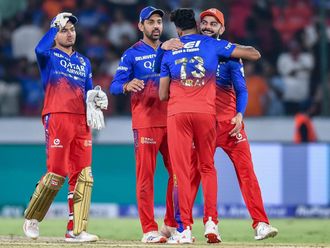New Delhi: Just one jammed, horn-honking road away from the Commonwealth Games stadium, the smoke of burning bodies blew high into the air above the cemetery fence.
In the eyes of the world it could have symbolised how India is piling up a funeral pyre for the old, wilting sporting event it is meant to be staging eight days from now.
The evidence to support that proposition not least in yesterday's pictures showing the grime-infested athletes' village is vast. No nation aspiring to a serious place on the world stage can have gone about its business with less organised guile.
But my first-hand, if snapshot, experience after arriving here yesterday morning is that the Games will probably go ahead, in one diminished form or another. As J.K. Galbraith, US ambassador to India observed of this diverse nation in the 1960s, it amounts to "functioning anarchy".
Mild optimism
One reason for my mild optimism is the sheer manpower at India's disposal. Only yesterday, with the carrot of perhaps Rs200 (Dh16.67), they managed to enlist an extra 1,000 workers to undertake last-minute remedial work on the village alone.
There were others laying tarmac, grouting, sanding and sweeping throughout the other sites. It helps when you have one billion people, most of them desperate for a folding note, to call upon.
There is also, I detected, a desire among those here to prove the world wrong.
On my arrival in Delhi — at an airport recently built to a high standard, thanks to private rather than government money — the staff were unfailingly polite. It was a trait discernible in everyone I met. There were special queue-avoiding routes for those of us with Commonwealth Games accreditation. The special counter must have had 20 staff. I was the only arrival. Had they not heard that next to nobody was coming?
Centrepiece of event
On to the Jawaharlal Nehru stadium, the proposed centrepiece of the Games. The blue seats were all in, bar one or two. There was the odd rough edge, but it was an impressive bowl worthy of any sporting occasion.
The inconvenience to the locals is one reason why The Times of India, who have been laudably independent in their coverage, carried a poll declaring that 97 per cent of the country believe the Games have tarnished India's image.
They also can't be pleased about the expense. Costs have gone up 525 per cent since the city won the bid. That is the official estimate. Unofficially, it is up 1,575 per cent, or 15 times the original estimate.
The Games look like they will go on, in their own, scatty way. Pride depends on it. But with athletes withdrawn, deadlines fumbled and security and safety concerns all too real, it will be the most chaotic and scary edition in Commonwealth history.












